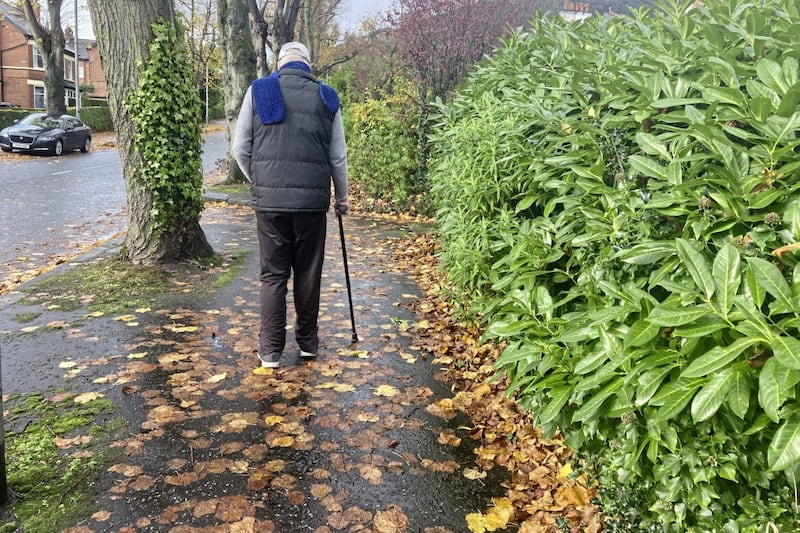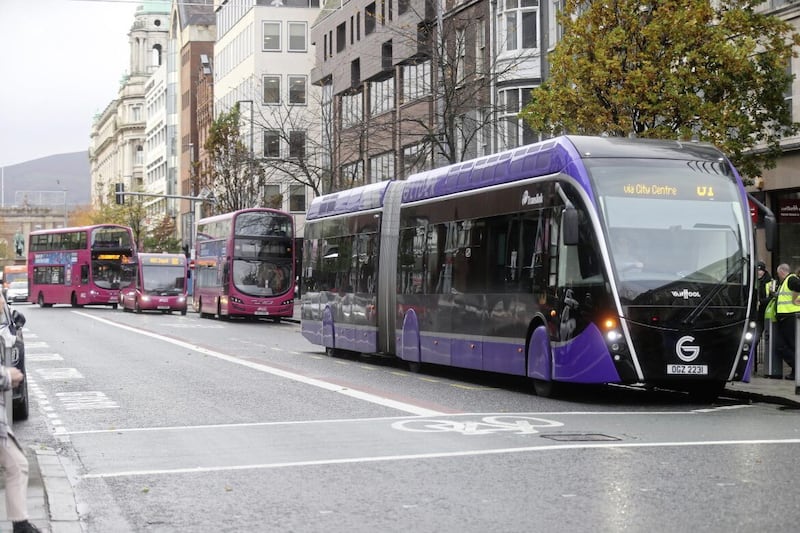[[ge:irishnews:irishnews:2441479]]
It’s a long time since my mother sent me to the haberdashery shop on the Cavehill Road with a note. The elderly lady went to a back room and came back with something wrapped up in brown paper and tied with string. A mystery parcel, no explanation.
Eventually I realised I was a messenger bringing home sanitary towels. How things have changed. This is no longer a secret not to be spoken about; older women are still modest but thankfully young women are prepared to face the problems surrounding periods and challenge embarrassment about a very natural bodily function that is all part of growing up.
No matter where in the world you are reading this you will probably be quite aware of women’s issues especially when it comes to menstruation and the menopause. Both are current talking points.
Recently Kemi Badenoch, the British minister for women and equalities, rejected calls to make it illegal to discriminate against women going through the menopause. She argued that women could use existing provisions in equality legislation to bring any discrimination cases.
"The menopause can be dealt with alongside three existing ones - age, sex, and disability - because it is a health condition and many disabilities are health conditions," she said. "We have the laws in place.”
She was asked whether menopause could be classed as a disability in discrimination cases.
A disability or not a disability?
"The menopause is not a disability, however a particular woman's experience of the menopause which can be a health condition, can be so extreme as to qualify for a disability,” said Ms Badenoch.
She also rejected the idea of a pilot for menopause leave, saying it was not the job of government to do something that employers could do anyway.
Could this debate result in employers rejecting mature women for jobs in case they end up having to agree to protracted time off?
It’s a hot topic at the moment. In November the Irish government will hold a vote in on removing "outmoded" references to a woman's place being in the home from the country's constitution.
Nearer home, Liz Wenden-Kerr is a practice nurse working in Belfast who was involved in setting up the first menopause cafe in Belfast.
"I’ve petitioned parliament to fund menopause awareness training for practice nurses. Although menopause has gained a lot of momentum, there is still not enough support for women in primary care. I need 100,000 signatures for this to be debated in parliament, so I would be really grateful if you could support the petition and help me promote it in any way."
Although a natural event in a woman’s life, many struggle during menopause. Around three-quarters experience symptoms which can last up to seven years. They can be severe and impact relationships, work and wellbeing. Symptoms are often attributed to other causes and remain untreated.
The deadline for Liz's petition is September 2, and no matter where you are in the world you can sign your support to 'Fund menopause awareness training for Practice Nurses' at petition.parliament.uk/petitions/633748.
Campaign for dignity
At the other end of the age range young women are now voicing their concern at the lack of attention being paid to menstruation and ‘period dignity’. I remember writing about the Red Box Project some years ago, a national network of volunteers who work together to provide free sanitary wear and spare underwear in schools and being shocked at the hundreds of young women who were losing regular schooling because they had no protection and were forced to stay at home.
At the International Women’s Day gathering at Writers' Square in Belfast earlier this month, the group Homeless Period Belfast was prominent among the organisations gathered for the 'Stand Up - Fight Back' rally and this was the very point they were addressing.
Founders Katie Bryce and Katrina McDonnell with Maedbh Donaghy and friends were drawing attention with their bright and bold banner. Theirs is a very straightforward campaign - provide sanity products free of charge in all public toilets, just as happens in Scotland. As they say, a period is a bodily function over which there is little or no control; 98 per cent of those surveyed said they have been caught out away from home, others simply can’t afford these products which are sometimes ‘luxury items’ at luxury prices.
According to the women some girls are using newspaper stuffed into socks or making pads from toilet paper. Those who are struggling financially will use anything or nothing - or resort to stealing. Far from a dignified experience.
Katie pointed out progress so far which includes talks at government level when Stormont was up and running. This was positive and they look forward to resuming them when the time comes. But the work goes on.
“Since 2016, we’ve been providing period packs to people in need, normalising the conversation on periods and campaigning for free period products in all toilets," she says.
"Our period packs reach rough sleepers, women's refuges, disadvantaged young people, homeless hostels, food banks, refugees and asylum seekers, survivors of human trafficking, individuals and families of low income.”
So the message is straightforward: free period products sitting alongside toilet paper, soap and hand towels - tampons or pads in every toilet be it in a cafe, school, hotel, local or council offices.
However, there is another aspect to be considered as Katrina explained. “There are women who have periods that actually force them to take time off work so they are having to use up their sick days. Because of the stigma they don’t feel comfortable explaining why they need time off. We’re here to support them.”
You can discover more about the group by searching on social media for 'The Homeless Period Belfast'.
The theme of International Women's Day last week was 'Embrace Equality - Stand Up, Fight Back' which focused on increasing sexual harassment. This is found especially online, with 58 per cent of young women having experienced this. Misogyny was also highlighted; dislike of, contempt for, or ingrained prejudice against women is more common than you might think.









